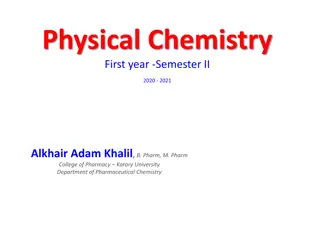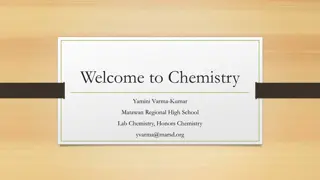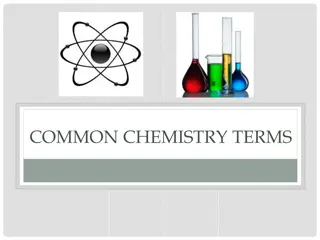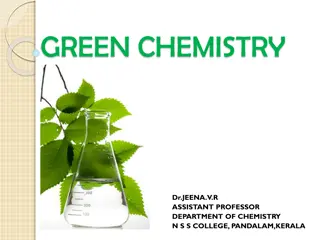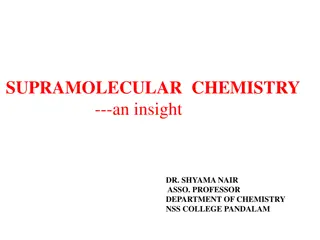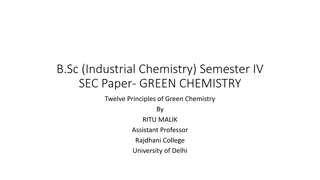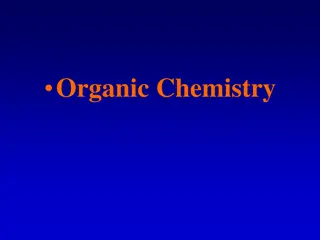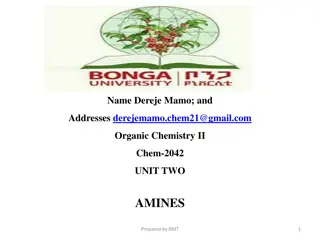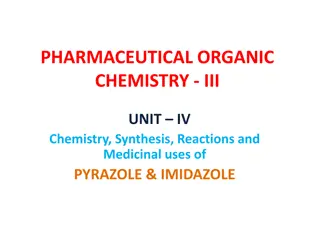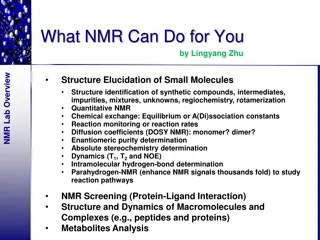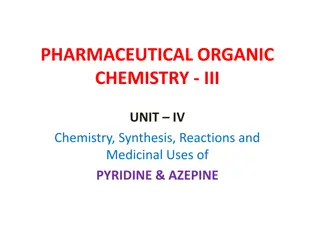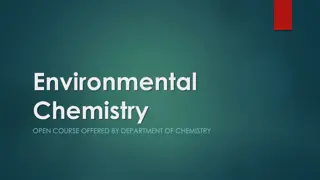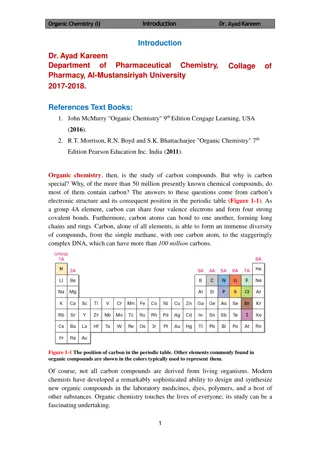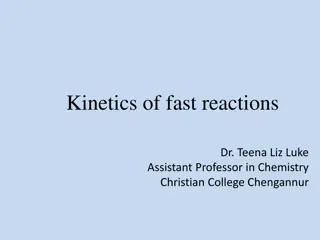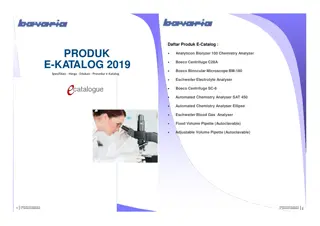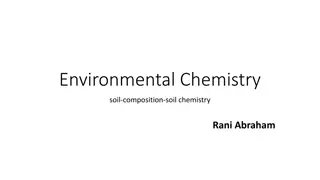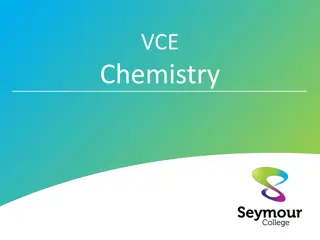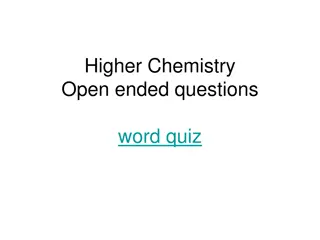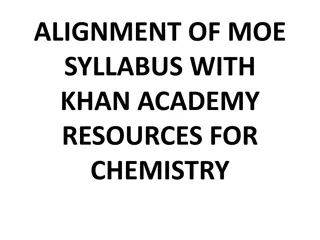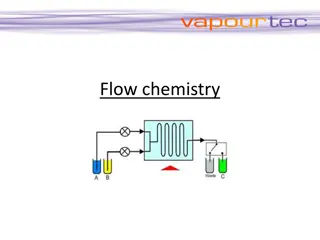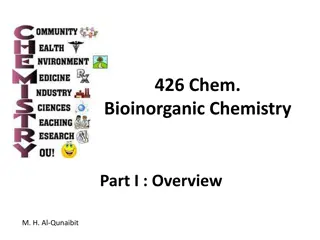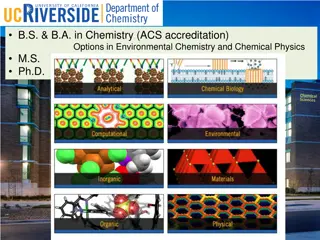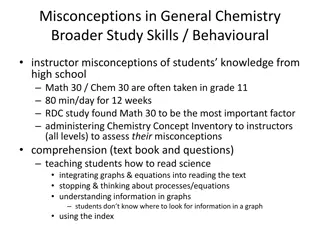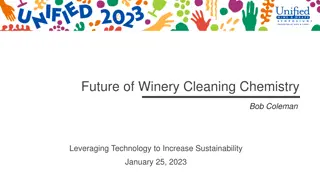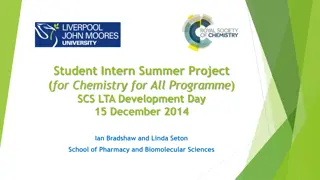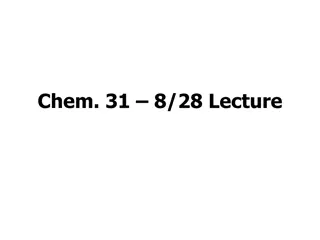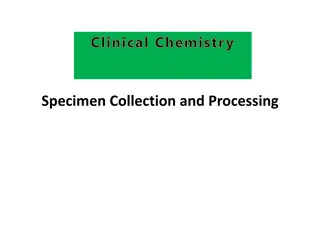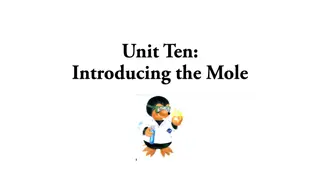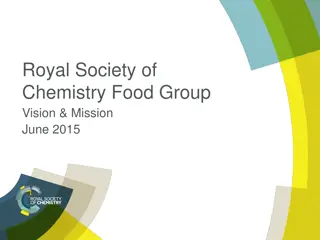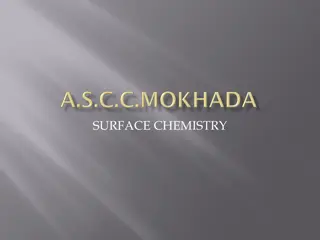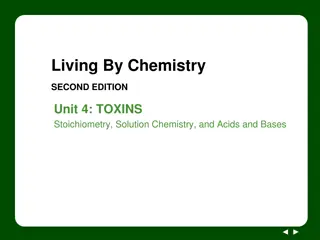Organometallic Chemistry (CHEM 42 1)
Organometallic chemistry delves into compounds with carbon-metal bonds, merging concepts from inorganic and organic chemistry. The field encompasses diverse compounds like ferrocene and tris(triphenylphosphine)rhodium carbonyl hydride, with nomenclature based on naming organic groups and adding meta
1 views • 13 slides
Green Chemistry and the Power of AI: Transforming Industries
Explore the principles and practices of green chemistry, focusing on safe and sustainable chemical processes that prioritize environmental impact. Learn how artificial intelligence is revolutionizing industries by enhancing efficiency, accuracy, and customer experiences. Discover the synergy between
4 views • 10 slides
Introduction to Chemistry: Matter, Energy, and Measurement
Chemistry is the study of matter, its properties, and the changes it undergoes. This content covers the basics of chemistry, including the classification of matter into pure substances and mixtures, different states of matter, and the building blocks of matter such as atoms and molecules. Sample exe
5 views • 51 slides
Introduction to Co-ordination Chemistry: Fundamentals and Applications
Explore the fascinating field of coordination chemistry, delving into the complexity of compounds and the coordination bonds that govern their structures. Discover the history, key concepts, and applications of coordination chemistry through a detailed examination of coordination compounds, bonding
13 views • 73 slides
Organometallic Compounds of Group 2 Elements
In the realm of organometallic chemistry, Group 2 elements, specifically alkaline earth metals like beryllium and magnesium, exhibit intriguing properties and reactivities. The chemistry of these elements, mimicking that of Group 12 elements in many aspects, leads to the formation of various organom
5 views • 27 slides
Fuel Your Success Conquer the IB Chemistry (SL and HL) Examination
Ignite your potential and achieve excellence in the IB Chemistry (SL and HL) Examination with our comprehensive study resources. Access practice exams, study guides, and expert guidance to excel in your test. Start your journey towards academic success today!\nClick Here to Get IB-Chemistry Dumps Wi
4 views • 6 slides
Role of Chemistry in Pharmaceutical Sciences
Medicines and drugs used for treating diseases are organic or inorganic chemicals. Studying drug chemistry is essential for pharmacists. This course covers fundamentals of chemistry, states of matter, radiochemistry, thermodynamics, kinetics, and chemical equilibria. Important subtopics include atom
2 views • 35 slides
Chemistry Course Overview for Matawan Regional High School
Yamini Varma-Kumar, a certified teacher with 13 years of experience, offers Chemistry and Honors Chemistry courses at Matawan Regional High School. The curriculum covers topics such as matter, elements, atomic structure, chemical reactions, and more. Students will develop skills in using the periodi
0 views • 8 slides
Understanding Common Chemistry Terms and Processes
Explore essential chemistry concepts such as matter, pH, acids, bases, mixtures, solutions, vaporization, sublimation, deposition, condensation, and freezing. Learn about the different states of matter, types of mixtures, and physical changes occurring in substances. Enhance your knowledge of chemis
0 views • 39 slides
Introduction to Green Chemistry and Its Principles
Green Chemistry promotes sustainable practices in chemical processes to reduce environmental impact. Dr. Jeena V., an Assistant Professor from Kerala, emphasizes the importance of principles such as prevention, atom economy, and safer chemical syntheses. Learn about the tragic Bhopal Gas Tragedy and
0 views • 23 slides
Exploring Supramolecular Chemistry: Insights and Applications
Supramolecular chemistry delves into the chemistry of molecular assemblies, intermolecular bonds, and non-covalent interactions, leading to the formation of supra-molecules through aggregation of molecular subunits. Concepts like molecular recognition, self-organization, and host-guest chemistry pla
0 views • 18 slides
Green Chemistry: Renewable Feedstocks and Biological Processes in Industrial Chemistry
Exploring the 7th principle of Green Chemistry focusing on the use of renewable feedstocks in industrial processes. Examples include transforming waste from seafood and paper industries into valuable materials, utilizing lipids and carbohydrates as feedstocks, and leveraging biological processes to
1 views • 21 slides
Understanding Organic Chemistry and Hydrocarbons
Dive into the world of organic chemistry, exploring the properties of organic compounds with carbon as the principal element. Discover the unique characteristics of carbon-to-carbon bonds, different types of hydrocarbons, and the structures formed in this fascinating branch of chemistry.
2 views • 60 slides
Understanding Amines in Organic Chemistry: Structure, Nomenclature, and Importance
Amines are organic derivatives of ammonia with a nitrogen atom containing a lone pair of electrons, making them basic and nucleophilic. They play crucial roles in living organisms, such as being building blocks of proteins and constituents of nucleic acids. Learn about the structure, nomenclature, a
2 views • 70 slides
Chemistry and Medicinal Uses of Pyrazole & Imidazole
Explore the chemistry, synthesis, reactions, and medicinal applications of pyrazole and imidazole compounds in pharmaceutical organic chemistry. Dive deeper into the molecular structures and understand the significance of these compounds in drug development and therapy.
1 views • 20 slides
NMR Applications in Organic Chemistry Research
NMR (Nuclear Magnetic Resonance) is a powerful technique used in organic chemistry research for a wide range of applications, including structure elucidation, identification of small molecules, quantitative analysis, and studying dynamics. Through various NMR experiments, researchers can determine s
1 views • 13 slides
Chemistry, Synthesis, Reactions, and Medicinal Uses of Pyridine & Azepine
Explore the fascinating world of pharmaceutical organic chemistry with a focus on Pyridine and Azepine. Learn about the chemistry, synthesis, reactions, and medicinal applications of these important compounds through a series of informative slides. Delve into the structural characteristics, synthesi
2 views • 23 slides
Environmental Chemistry Open Course: Understanding Pollution and Control Measures
Dive into the world of environmental chemistry with this comprehensive open course offered by the Department of Chemistry. Explore the causes, effects, and control measures of air, water, soil, noise, thermal, light, and radioactive pollutions. Gain insights into pollution terminology, water quality
3 views • 9 slides
Understanding Complex Ions and Coordinate Bonds in Chemistry
Complex ions in chemistry are formed when transition metals or their ions bond with ligands through coordinate bonds. Ligands utilize their lone pairs of electrons to form dative covalent bonds with transition metals, determining the coordination number of the cation. Complex ions play a crucial rol
1 views • 29 slides
Understanding Organic Chemistry: Introduction to Carbon Compounds
Organic chemistry is the study of carbon compounds, with carbon's unique electronic structure allowing for a vast array of compounds. This field touches many aspects of life, from medicines to polymers. The nucleus of an atom, comprising protons and neutrons, is surrounded by electrons occupying orb
1 views • 5 slides
Understanding the Kinetics of Fast Reactions in Chemistry
Kinetic methods involve measuring analytical signals under dynamic conditions to study fast reactions in chemistry. This study explores the various methods used, such as Flow Method and Stopped Flow Method, to determine reaction rates accurately. Advantages of the Stopped Flow Method over Continuous
0 views • 18 slides
Laboratory Equipment E-Catalog 2019
Explore the E-Catalog featuring various laboratory equipment such as the Analyticon Biolyzer 100 Chemistry Analyzer, Boeco Centrifuge C28A, and Eschweiler Blood Gas Analyzer. View specifications, prices, education materials, and procedures for these advanced laboratory tools. The catalog includes es
2 views • 7 slides
Understanding Soil Chemistry and Redox Reactions in Environmental Chemistry
Soil chemistry plays a crucial role in sustaining healthy soils by influencing nutrient availability through oxidation and reduction processes. Redox reactions in soil are impacted by factors like oxygen content and water presence, affecting nutrient supplies. The redox status of soil reflects its n
1 views • 92 slides
Explore Chemistry with Seymour College - VCE Chemistry Course Overview
Dive into the world of chemistry with Seymour College's VCE Chemistry course. Discover the nature of matter, chemical reactions, design innovation, and carbon compounds. Explore diverse pathways in environmental technology, academia, health sciences, and more. Prepare for a challenging yet rewarding
0 views • 5 slides
Understanding Chemistry through Open-Ended Questions
The content provides a detailed assessment of student responses to open-ended chemistry questions related to hydrogen peroxide and its applications in teeth whitening gels. Various student answers are analyzed based on their understanding of the chemistry concepts involved, with explanations given f
1 views • 18 slides
Comprehensive Alignment of MOE Chemistry Syllabus with Khan Academy Resources
This comprehensive alignment showcases the correlation between the Ministry of Education (MOE) chemistry syllabus and the educational resources provided by Khan Academy. It covers various topics in chemistry such as the particulate nature of matter, atomic structure, chemical bonding, stoichiometry,
1 views • 9 slides
Understanding Flow Chemistry for Efficient Chemical Reactions
Flow chemistry, also known as continuous flow or plug flow chemistry, revolutionizes chemical reactions by running them in a continuous flow stream. This dynamic process offers efficient manufacturing of chemical products with precise control over critical parameters like stoichiometry, mixing, temp
2 views • 7 slides
Exploring Bioinorganic Chemistry: Connecting Inorganic and Biochemistry
Bioinorganic Chemistry bridges the gap between inorganic chemistry and biochemistry, understanding the vital role of inorganic elements in living systems. This interdisciplinary field delves into the structure, function, and exploitation of metal ions in biological processes, emphasizing their inter
0 views • 47 slides
UC Riverside Chemistry Program: Excellence in Education and Research
UC Riverside's Chemistry Program offers a range of options in ACS-accredited Chemistry education, with highlights including a distinguished faculty, substantial research funding, and high rankings. The program also boasts a Nobel Prize-winning faculty member and a comprehensive curriculum that cover
0 views • 5 slides
Overcoming Misconceptions in Chemistry Education
Addressing misconceptions in general chemistry education, focusing on student knowledge from high school Math and Chemistry courses. Emphasis on student motivation, learning strategies, and common misconceptions in understanding scientific concepts. Strategies for enhancing comprehension, applicatio
0 views • 12 slides
Innovations in Winery Cleaning Chemistry for Sustainability
Explore the future of winery cleaning chemistry through leveraging technology and sustainable practices. Considerations for chemistry selection focusing on safety, hazardous materials, employee well-being, and environmental impact are highlighted. Current cleaning chemistry practices, including the
0 views • 19 slides
Overview of LJMU Chemistry for All Programme Summer Internship Project
LJMU's Chemistry for All Programme aims to enhance student experiences through summer internships, curriculum development, and outreach activities. The project, funded by the Royal Society of Chemistry, involves a cross-university collaboration to engage local schools and foster interest in chemistr
0 views • 21 slides
Understanding Quantitative Analysis in Chemistry
Quantitative analysis in chemistry involves determining the concentration or mass of a compound in a sample, which is crucial for various applications such as measuring intoxication levels, assessing health risks, and determining the benefits or harm of substances. This course, taught by experienced
0 views • 16 slides
Clinical Chemistry Specimen Collection and Processing Overview
Clinical chemistry specimen collection involves obtaining blood samples for analysis. Serum and plasma are commonly used specimens, each requiring specific handling. Different anticoagulants like heparin are used to prevent blood clotting during sample processing. Heparin, a widely used anticoagulan
0 views • 15 slides
Understanding Unit Conversion and Mole Concept in Chemistry
Explore the concepts of unit conversion and the mole in chemistry, including how to convert between different units, relate mass to atoms and molecules, calculate molar mass, and perform conversions involving substances like chalk and sodium hydroxide. Discover the importance of dimensional analysis
0 views • 12 slides
Royal Society of Chemistry Food Group Vision & Mission Summary
The Royal Society of Chemistry Food Group aims to lead, promote, and disseminate the understanding and importance of chemistry in food. Their vision is to enhance food and nutrition security through advancing the chemistry of food ingredients. They strive to engage with various communities to promot
0 views • 4 slides
Understanding Surface Chemistry and Adsorption Phenomena
Surface chemistry is a crucial branch of chemistry that focuses on the chemical processes occurring at interfaces between different surfaces like solid-liquid, solid-gas, and liquid-gas. This field plays a significant role in various industries, including electronics. Adsorption, absorption, and sor
0 views • 15 slides
Chemistry 1151K Course Overview and Chapters Summary
Upon completion of the CHEM 1151K course, students will apply the scientific method to investigate chemical questions in allied health, utilize dimensional analysis to solve quantitative problems, communicate effectively using chemical terminology and symbols, describe the behavior of biochemical so
0 views • 44 slides
Biochemistry and Chemistry Elective Courses Overview at SRCASW
The Shaheed Rajguru College of Applied Sciences for Women offers elective courses in Biochemistry and Chemistry. The Biochemistry course covers biomolecules like amino acids, proteins, carbohydrates, lipids, and nucleic acids, emphasizing their properties and functions. It also includes practical ex
0 views • 19 slides
Understanding Molar Mass and Conversions in Chemistry
Explore the concept of molar mass, moles of atoms, and conversions between mass and moles in chemistry through an engaging lesson on toxins, stoichiometry, solution chemistry, and acids and bases. Learn how to calculate molar mass, describe the magnitude of a mole of a substance, and conduct simple
0 views • 10 slides






